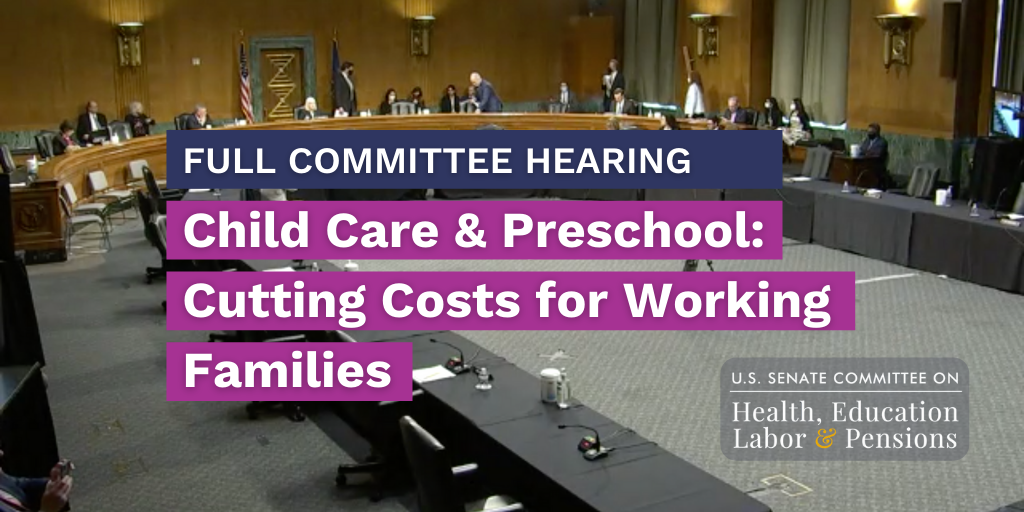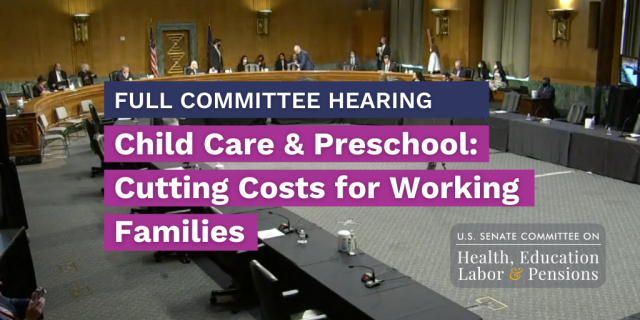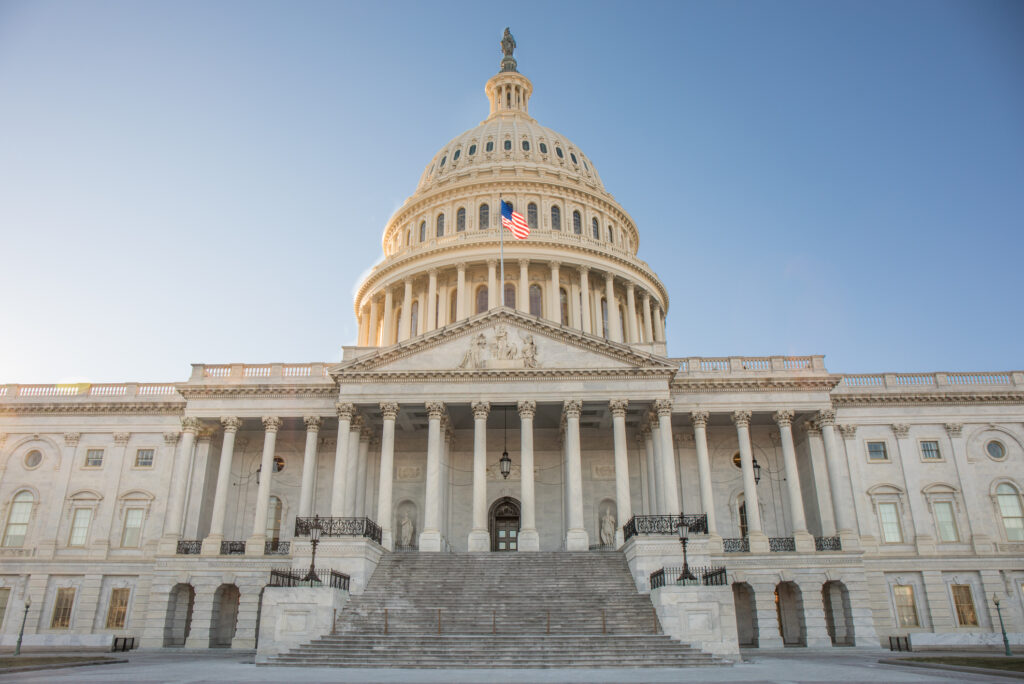Senate Hearing Reinforces Reconciliation Is Essential to Funding Needed for Solving Child Care Crisis

WASHINGTON — Today, the U.S. Senate Committee on Health, Education, Labor & Pensions (HELP) held a hearing on the state of America’s child care crisis, with testimony from policy experts, practitioners, and state leaders on the opportunity — and significant need — for Congress to support a strong, stable early learning system. The hearing showcased the universal understanding among Democrats and Republicans on the Committee about Congress being essential to solving the child care crisis. All four witnesses underscored the realities families face, the role stable, quality child care plays in our economy, and cited the need for significant federal investment in child care through reconciliation.

“The economics of our early learning sector as it exists today are unsustainable for everyone involved,” said First Five Years Fund Executive Director Sarah Rittling. “We cannot continue asking parents to go bankrupt paying for the child care they need to work and earn a living; and we can’t keep expecting early educators to earn poverty wages doing the skilled, labor-intensive work of supporting children’s healthy development. Today’s hearing offered clear agreement on the need for Congress to act quickly on child care.”
Every single senator who joined today’s hearing — from both sides of the aisle — spoke about the essential role child care plays for families and our economy, and each one also talked about Congress’s role in ensuring working families can access quality, affordable early learning programs. Right now, existing federal programs only reach a fraction of even the families who meet eligibility requirements, like income. Important but moderate discretionary funding increases to those programs in recent years have not enabled them to meet the needs of the targeted populations they are intended to serve. Meanwhile, families at all socioeconomic levels are affected by the high cost and limited supply of quality care options, while 75% of America’s child care providers fear the end of recent federal relief funding that has kept them in business over the past two years.
“My message today is that when it comes to child care—one of the big budget items most working families have to navigate—the status quo isn’t working—at all—for the millions of parents who need child care and the providers who need to recruit and retain talented educators. And nothing like the status quo is going to cut it.” — HELP Committee Chair Senator Patty Murray (D-WA)
“If we want to see folks coming back to work, solving this [child care] problem — bridging the gap — is so critically important to the kids who are literally looking for a safe place to learn, for parents who are looking for a way to be able to have their kids in a safe environment, a good environment, so they can continue to work. Because you can’t work and be at home at the same time. We saw that problem exacerbated throughout the pandemic.” — Senator Tim Scott (R-SC)
“It’s pretty clear out there that our child care providers in this country, certainly in my state, are really barely making ends meet. Providers are competing with other employers for workers that makes it a challenge. Too many parents cannot afford high quality child care even if they can find it. We have to value the services, the care, the commitment that come from child care providers for our little ones and if you look at it, it looks like we haven’t placed any value on it.” — Senator Lisa Murkowski (R-AK)
“I’m amazed at the bipartisan nature of this hearing in terms of what people are agreeing on here. One, that a greater investment in high quality child care would be good for kids. Two, that the greater investment would be good for families. Three, that the greater investment would be good for educators. And four, that the greater investment would be good for the workforce.” — Senator Tim Kaine (D-VA)
“Families across the country are struggling with rising costs including the high cost of child care. Right now programs like Head Start and the CCDBG program serve a relatively small number of families but most middle class Granite Staters with child care needs don’t have access to these programs. The lack of access to safe, affordable child care is keeping some parents out of the workforce exacerbating our workforces shortages and hindering economic growth.” — Senator Maggie Hassan (D-NH)
The witnesses who testified at today’s hearing were:
- Rhian Evans Allvin, CEO, National Association for the Education of Young Children (NAEYC)
- Julie Kashen, Director, Women’s Economic Justice, and Senior Fellow, The Century Foundation
- Maria-Isabel Ballivian, Executive Director, ACCA Child Development Center
- Ellen Reynolds, Chief Executive Officer, Georgia Child Care Association
Read their full testimonies here.
Last week, a new report from Goldman Sachs and its 10,000 Small Businesses Voices initiative listed solving America’s child care crisis as one of four key areas of focus for federal policymakers to “help small businesses recover, build resilience, create jobs, and be positioned for growth.” Meanwhile, analysis from Wells Fargo found that nearly half a million families have been impacted by the nationwide child care crisis, stating, “The [child care] industry packs an outsized punch when it comes to lifting the economy’s labor supply. Access to affordable childcare has been shown time and again to boost labor force participation among mothers in addition to supporting the longer-term outlook for the labor supply.”
The overwhelming evidence makes clear that America’s child care crisis cannot and will not self correct, and significant, sustained funding is required to build an early learning system that meets the needs of those who rely on it. Right now, reconciliation offers the only way for Congress to secure and provide the level of funding required to meaningfully achieve solutions to the child care challenges facing families, providers, and our economy.
Subscribe to FFYF First Look
Every morning, FFYF reports on the latest child care & early learning news from across the country. Subscribe and take 5 minutes to know what's happening in early childhood education.



